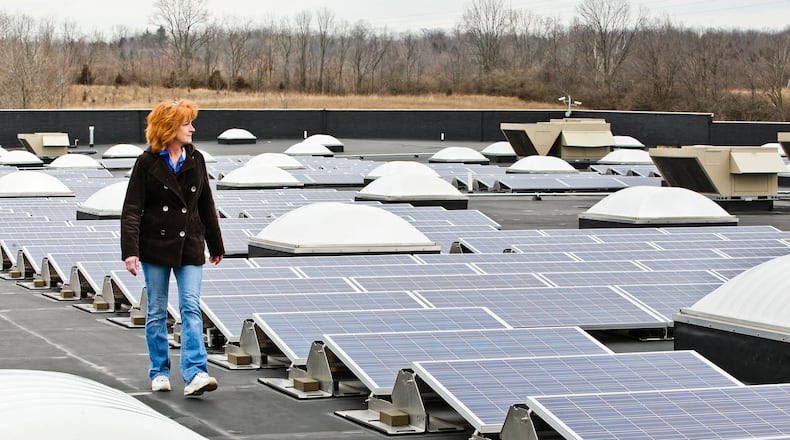Energy efficient options decrease electric and lighting costs and phasing out single-use bags means retailers won’t have to buy them anymore, which adds up quickly for major corporations like Walmart, Kroger, Aldi, Meijer and other household grocery names.
But smaller grocery stores are also joining the ranks of more eco-friendly companies, said Nick Moshos, owner of the Kettering Dot’s grocery store.
“It’s always important to consume less and go green…It’s very important for the young, up-and coming shopper. We want to live in a healthier world; that’s why the green initiatives have been pushed so hard,” Moshos said.
»BIZ BEAT: Owner of Kay Jewelers, Jared plans more than 150 closures
Millennials are some of the biggest players in demanding green action be taken, said Chad Hammerschmidt, interim chair of the Department of Earth and Environmental Science at Wright State University. Young adults are also the group that hasn’t yet decided what stores they’re loyal to, Dugan said. The green policies could convert millennials who occasionally shop many different grocery stores to a loyal customer of one company.
Dot’s has been pushing paper over plastic and reusable bags for years and customers who bring reusable bags can get 5 cents off their total for each bag used, Moshos said. Walmart also recently said its reusable bags for purchase will be more visible on checkout carousels next month.
Kroger plans to phase out single-use plastic bags by 2025 as part of its larger Zero Hunger, Zero Waste sustainability initiative, said Erin Rolfes, spokeswoman for the Cincinnati Kroger division, which includes Dayton-area stores.
Most stores also include plastic recycling bins where shoppers can drop off the single-use plastic bags along with other plastic films like bread bags and paper towel packaging, the store leaders said.
“Plastic in the environment is a huge issue that we’re going to have to deal with in the future, even if we stop using it now,” Hammerschmidt said.
The bags can take between 300 and 500 years to degrade, and when floating in the ocean, the plastics are consumed by plankton and animals, including fish. Up to 30 percent of a fish’s guts could be plastic, Hammerschmidt said, and contaminants from the plastic could get into the muscle that people eat.
»BIZ BEAT: Area Walmart stores part of major technology upgrade across Ohio
To start the transition to reusable bags, Hammerschmidt said stores should start charging for the single-use bags and give reusable bags away for a period of time to incentivize customers to make the change.
Grocers are also working to consume less energy, Rolfes said. As Kroger continues remodeling its stores, the company has added more efficient enclosed cases for salads and single-serve juices traditionally in open coolers.
Store remodels also come with LED lights, Rolfes said. Walmart and Dot’s both also have switched to LED lights over the last several years, with all the retailers saying the switch has saved money. At Walmart, more than 6,000 LED lighting fixtures in stores, offices and parking lots has saved hundreds of millions of dollars over the last decade, Ragland said.
Walmart is working toward 100% renewable energy, with a goal of reaching at least 50% by 2025, Ragland said. There are over 364 solar installations on store roofs with plans to increase to 500 by the end of next year. At least 10 Ohio stores have the solar systems, including Mason, Xenia, Greenville, Middletown, Franklin and two in Cincinnati, according to previous Dayton Daily News reporting.
Meijer is testing wind turbines for renewable energy at some Michigan stores, according to its website.
Walmart is also working to expand its electric vehicle charging stations that are currently at stores in Mason, West Chester and Cincinnati, among about a dozen others in Ohio. But Walmart is planning to expand several hundred more across 36 states including Ohio.
»BIZ BEAT: Dayton construction firm grows by growing its own employees
“We want to help contribute to creating a national infrastructure to where EV car users have increased access to being able to charge their vehicles,” Ragland said.
Meijer is also testing charging stations at select Michigan stores, according to its website.
Kroger reduces waste locally through a food rescue program, Rolfes said. After a few days on the sales floor, produce will be sold at a discount before being sent to food pantries on their last good day. From there, the foods will be send to farmers to feed animals or could be used for composting. If there’s anything that can’t be used, then it will go to the landfill.
“Being good corporate citizens is of course important for us. And being in that food business, we see that if you look from farmer growing the food to the person shipping it to us getting it as customers, in the U.S. we throw away about $218 billion of food away…And then you think about all the people in the community who are struggling to find their next meal,” Rolfes said.
FIVE FAST READS
• Prominent Oakwood boutique set to close
• $3 a gallon gas could be on the horizon sooner than you think
•Dayton Mall launches new family-friendly entertainment option
About the Author
